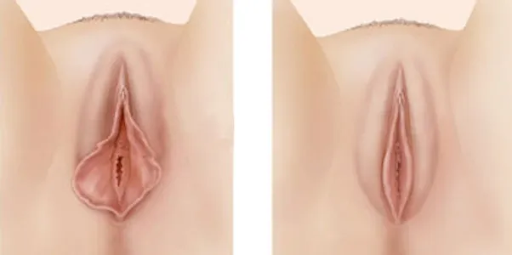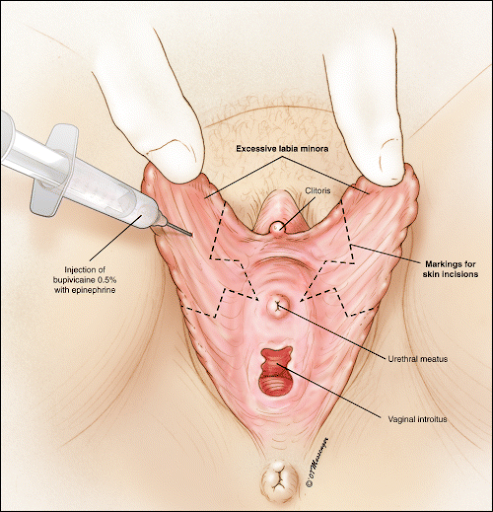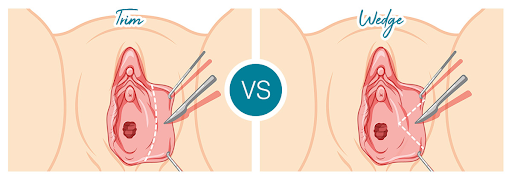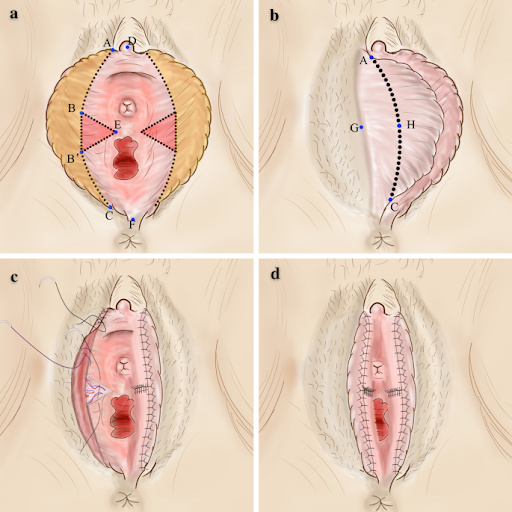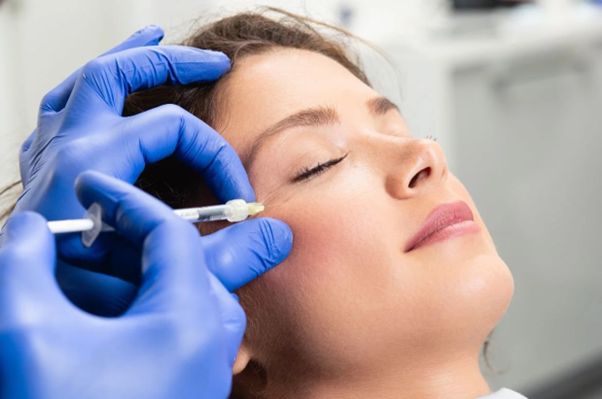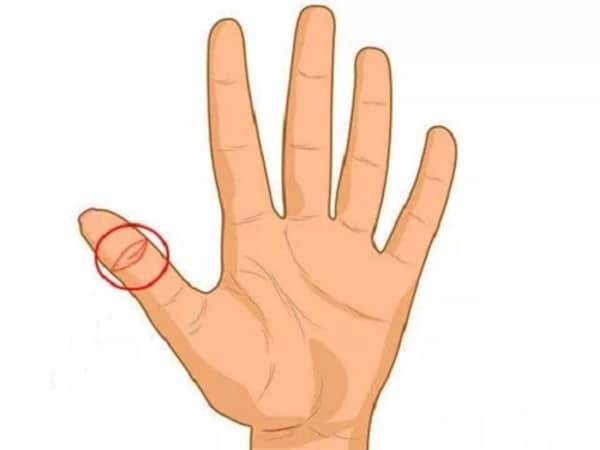In recent years, one such procedure aesthetic and functional treatments for intimate areas is minor labial plasty. Despite its growing popularity, many women still feel unsure or uninformed about what the procedure involves, who it’s for, and whether it’s safe.
Minor labial plasty is a surgical solution designed to reshape the inner vaginal lips
What is Minor labial plasty?
Minor labial plasty, often referred to as labia minora reduction, is a surgical procedure to reshape or reduce the size of the inner vaginal lips. The goal is to create symmetry, reduce elongation, or address physical discomfort caused by enlarged or uneven labia.
While variations in labial size and appearance are completely normal, some women may experience a range of challenges related to enlarged or asymmetrical labia. These can include pain or irritation during physical activities or sexual intercourse, discomfort when wearing tight clothing, recurring hygiene issues or infections, and emotional distress or feelings of self-consciousness about their appearance.
Minor labial plasty offers a permanent and safe solution for women seeking relief or aesthetic improvement in the intimate area.
Common reasons women choose Minor labial plasty
Labial plasty is a highly personal decision, but common motivations include:
Physical discomfort
Some women experience pain, itching, or chafing from labial tissue rubbing against clothing, especially during cycling, yoga, or running. Reducing the tissue helps eliminate these issues.
Sexual confidence
Enlarged or asymmetrical labia can cause embarrassment or discomfort during intimacy. After surgery, many women report increased confidence and greater comfort during sexual activity.
The reason of minor labial plasty is for improved comfort, hygiene, and confidence
Post-childbirth or aging Changes
Childbirth, hormonal changes, or aging may stretch the labia minora, resulting in cosmetic or functional concerns. Labial plasty helps restore a youthful, balanced appearance.
Aesthetic preferences
Some women simply prefer a neater, tucked-in look or wish to improve asymmetry, which is entirely valid and increasingly normalized in the beauty and wellness space.
How is the procedure performed?
Minor labial plasty is a minor surgical procedure typically performed under local anesthesia with sedation or general anesthesia, depending on the case and patient preference. The procedure usually lasts between 45 minutes to 1.5 hours.
There are two main surgical techniques used:
Trim Method
This involves removing the excess edge of the labia and suturing the area to create a smoother, smaller contour. It’s the most commonly used method and is ideal for reducing pigmentation or irregular edges.
Wedge Method
In this technique, a wedge-shaped portion of tissue is removed from the thickest part of the labia while preserving the natural edge. It’s preferred when maintaining the labial border is a priority.
The choice of technique depends on the individual’s anatomy, goals, and desired outcome, which will be carefully discussed during the consultation.
The choice of technique depends on individual anatomy and desired outcomes
What is the recovery for minor labial plasty like?
Immediate post-procedure
Right after the procedure, it is normal to experience mild swelling, bruising, and some discomfort in the treated area. To support proper healing, patients are advised to rest for 2 to 3 days, avoid any friction or pressure on the area, and wear loose, breathable underwear to minimize irritation and promote airflow.
Healing timeline
Most of the swelling typically subsides within two weeks. The dissolvable sutures used during the procedure usually disappear naturally within 3 to 4 weeks. Patients should refrain from sexual activity and strenuous physical exercise for about 4 to 6 weeks to allow the tissue to heal properly. Full recovery and final aesthetic results are generally visible between 8 to 12 weeks after the procedure.
Is minor labial plasty safe?
Yes, when performed by a qualified, experienced surgeon in a sterile and accredited facility, minor labial plasty is considered very safe. Like all surgical procedures, it carries certain risks, although they are rare when performed by experienced surgeons. One potential complication is infection, which can occur if the surgical site is not properly cared for during recovery. Another uncommon but possible risk is excessive bleeding during or after the procedure.
Patients may also experience scarring or asymmetry in the labial appearance as the tissues heal, although these outcomes are typically minimized with expert technique. Additionally, some individuals may notice a temporary loss of sensation in the treated area, which usually resolves on its own over time. Choosing a reputable clinic and following all pre- and post-operative instructions is the key to minimizing these risks.
Who is a Good candidate for minor labial plasty?
You may be an ideal candidate for minor labial plasty if you are in good overall health and not currently pregnant or breastfeeding. This procedure is best suited for individuals who are physically stable and able to undergo minor surgery without increased risk. Ensuring your body is in a healthy condition helps promote faster recovery and reduces the likelihood of complications during or after the procedure.
Additionally, this surgery may benefit those who experience physical discomfort or emotional distress due to the shape or size of their labia. If you have realistic expectations about the outcomes and are willing to follow all post-operative care instructions and activity restrictions, you are more likely to achieve satisfying results.
Understanding the recovery process and being mentally prepared are key to a smooth and successful healing journey
Frequently asked questions for minor labial plasty
Will it affect sensitivity or sexual pleasure?
Most women do not report any negative effect on sexual pleasure. In fact, many experience enhanced comfort and confidence after healing.
Will there be visible scars?
Scars are minimal and well-hidden, typically healing to nearly invisible lines due to the natural folds and tissue in the area.
What are the risks?
As with any surgery, risks include infection, bleeding, asymmetry, and changes in sensation. However, these are rare when the procedure is performed in a professional, sterile environment by a qualified surgeon.
Is the result permanent?
Yes, the results of minor labial plasty are considered permanent, although natural aging and childbirth can still affect the area over time.
Is it covered by insurance?
Since labial plasty is often considered a cosmetic procedure, insurance usually does not cover the cost. However, if done for medical reasons (chronic irritation, hygiene issues), partial coverage might be possible depending on the provider.
How much does it cost?
Pricing depends on the technique used, the surgeon’s experience, and the clinic location. A private consultation is necessary to provide an accurate quote.
Choose Dr. Harvard for minor labial plasty – Is it trustworthy ?
At Dr. Harvard, we understand that intimate procedures require the highest level of skill, confidentiality, and compassion. Our clinic is a trusted destination for clients seeking both aesthetic enhancement and functional relief in a supportive, judgment-free environment.
Dr. Harvard is a highly trusted name in the field of intimate aesthetics, known for delivering natural, safe, and satisfying results. Our team includes skilled, board-certified surgeons who specialize in delicate procedures like minor labial plasty, ensuring both precision and discretion. We operate in a modern, accredited clinic equipped with advanced technology, prioritizing your safety and comfort at every step. From private consultations to post-operative care, our approach is respectful, professional, and patient-centered. With a strong reputation, proven expertise, and numerous satisfied clients, Dr. Harvard is a reliable choice you can trust with confidence.
If you’re ready to take the next step in reclaiming comfort and confidence in your body, we invite you to schedule a confidential consultation with Dr. Harvard today.

